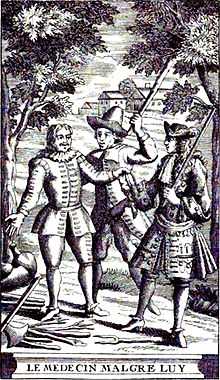Le Médecin malgré lui

Le Médecin malgré lui (French pronunciation: [lə medsɛ̃ malɡʁe ˈlɥi]; "The doctor/physician in spite of himself") is a comedy by Molière first presented in 1666 at le théâtre du Palais-Royal by la Troupe du Roi.[1] The play is one of several plays by Molière to center on Sganarelle, a character that Molière himself portrayed.
Characters
- Sganarelle, a drinking, gluttonous woodcutter (The title character)
- Martine, Sganarelle's wife
- Lucinde, Sganarelle's patient
- Léandre, Sganarelle's friend; Lucinde's lover
- Géronte, a wealthy bourgeois; father of Lucinde
- Valère, A valet to Géronte
- Lucas, A servant
- Jacqueline, Lucas' wife and Géronte's nurse, who is seduced by Sganarelle
- Monsieur Robert, Sganarelle's neighbor
- Thibaut, A peasant
- Perrin, A peasant; son of Thibaut
Synopsis
Sganarelle makes life a living hell for his wife and family. He spends all their money on food and drink. As revenge for his sloppy existence, his wife, Martine, plays a trick on him. She hears three servants to a rich family say they need a doctor, and so she tells them that Sganarelle is the greatest doctor in the world. The servants insist to him that, as a famed doctor, he must accept a position with their employers (they beat him with sticks to persuade him), he accepts the lucrative position even though, as an alcoholic woodcutter, he has no idea what a doctor should know. He helps a rich man's daughter who has "lost" her voice.
Farcical comedy ensues, climaxing with Sganarelle almost being executed, before slipping out at the last minute. All ends well, and Sganarelle becomes a rich man and a respected "doctor".
Sganarelle's Monologue
A large amount of the play consists of Sganarelle's boastful comic monologues. Below is a translation of Sganarelle's most famous speech, which is considered one of the funniest in French Theatre:
No, I tell you; they made a doctor of me in spite of myself. I had never dreamt of being so learned as that, and all my studies came to an end in the lowest form. I can't imagine what put that whim into their heads; but when I saw that they were resolved to force me to be a doctor, I made up my mind to be one at the expense of those I might have to do with. Yet you would hardly believe how the error has spread abroad, and how everyone is obstinately determined to see a great doctor in me. They come to fetch me from right and left; and if things go on in that fashion, I think I had better stick to physic all my life. I find it the best of trades; for, whether we are right or wrong, we are paid equally well. We are never responsible for the bad work, and we cut away as we please in the stuff we work on. A shoe maker in making shoes can't spoil a scrap of leather without having to pay for it, but we can spoil a man without paying one farthing for the damage done. The blunders are not ours, and the fault is always that of the dead man. In short, the best part of this profession is, that there exists among the dead an honesty, a discretion that nothing can surpass; and never as yet has one been known to complain of the doctor who had killed him."
Adaptations
Charles Gounod wrote an opera based on Molière's play, also entitled Le médecin malgré lui.[2] It was adapted by Henry Fielding as The Mock Doctor.
An hour-long radio adaptation of the play by Ernest Kinoy was performed on the NBC Theatre on June 25, 1950.
- Films
- Le Médecin malgré lui, directed by Émile Chautard, 1910
- Medico per forza, directed by Carlo Campogalliani, with Ettore Petrolini, 1931
- The Doctor in Spite of Himself, Hong Kong film starring Cheung Tat-ming, 1999
References
- ↑ "Le Médecin malgré lui", site-moliere.com, accessed September 20, 2012
- ↑ Haubner S. "Le médecin malgré lui" in The New Grove Dictionary of Opera, (Ed.) Sadie S., London & New York: Macmillan, 1997
